Collaborative Mental Health Nursing: Lived Experiences & Practice
VerifiedAdded on 2023/06/07
|9
|2425
|302
Report
AI Summary
This report explores the significance of incorporating lived experiences into mental health nursing practice. It discusses how understanding the perspectives of individuals with mental disorders can enhance person-centered care and collaborative approaches. The report also addresses the pervasive issue of stigma associated with mental illness, highlighting its detrimental impact on individuals' lives and recovery. Furthermore, it reflects on personal nursing practice, identifying areas for development in order to foster more effective collaboration with individuals who have lived experience of mental disorders. The report concludes by emphasizing the importance of empathy, compassion, and empowerment in combating stigma and promoting a more inclusive and supportive environment for individuals with mental health challenges. Desklib offers a variety of resources, including past papers and solved assignments, to support students in their academic pursuits.
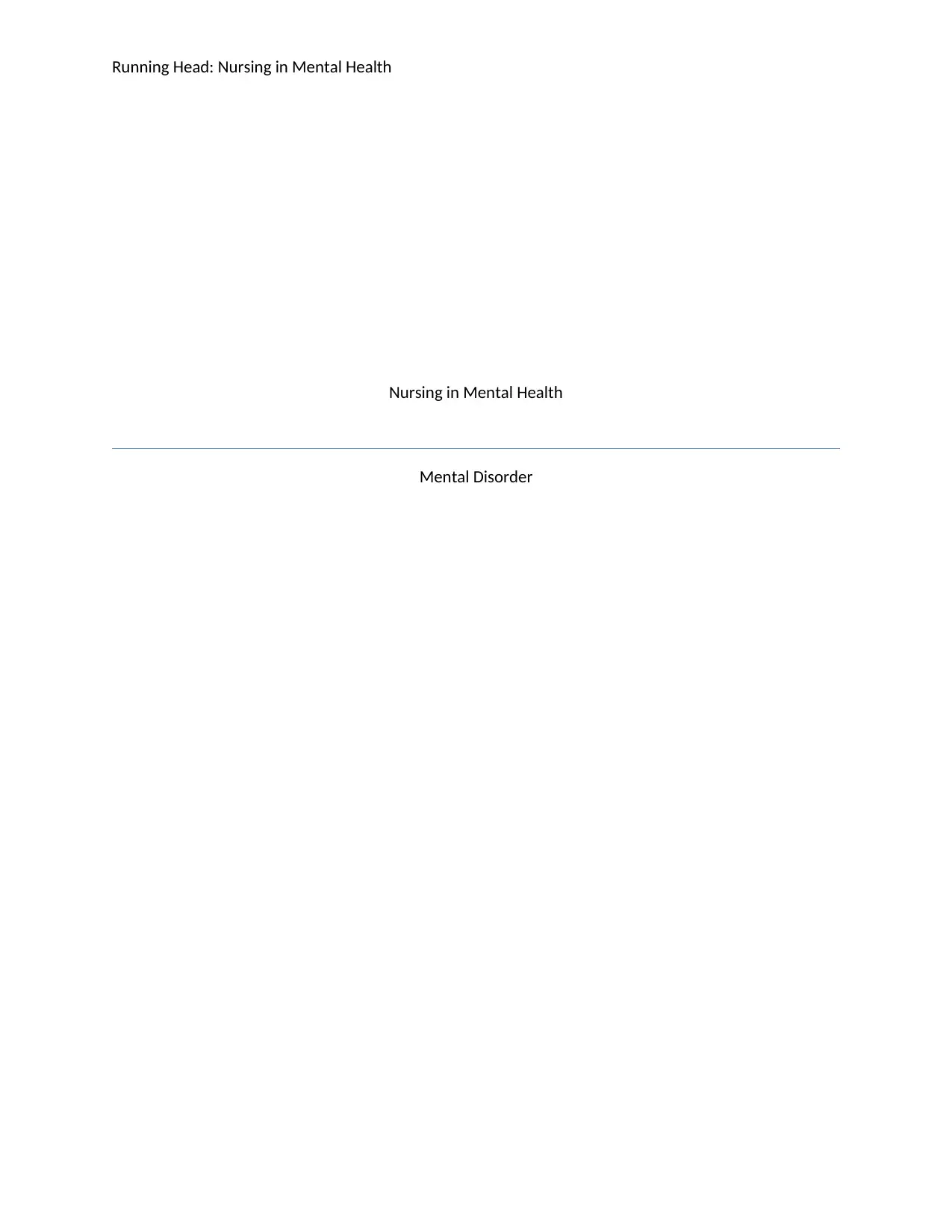
Running Head: Nursing in Mental Health
Nursing in Mental Health
Mental Disorder
Nursing in Mental Health
Mental Disorder
Paraphrase This Document
Need a fresh take? Get an instant paraphrase of this document with our AI Paraphraser
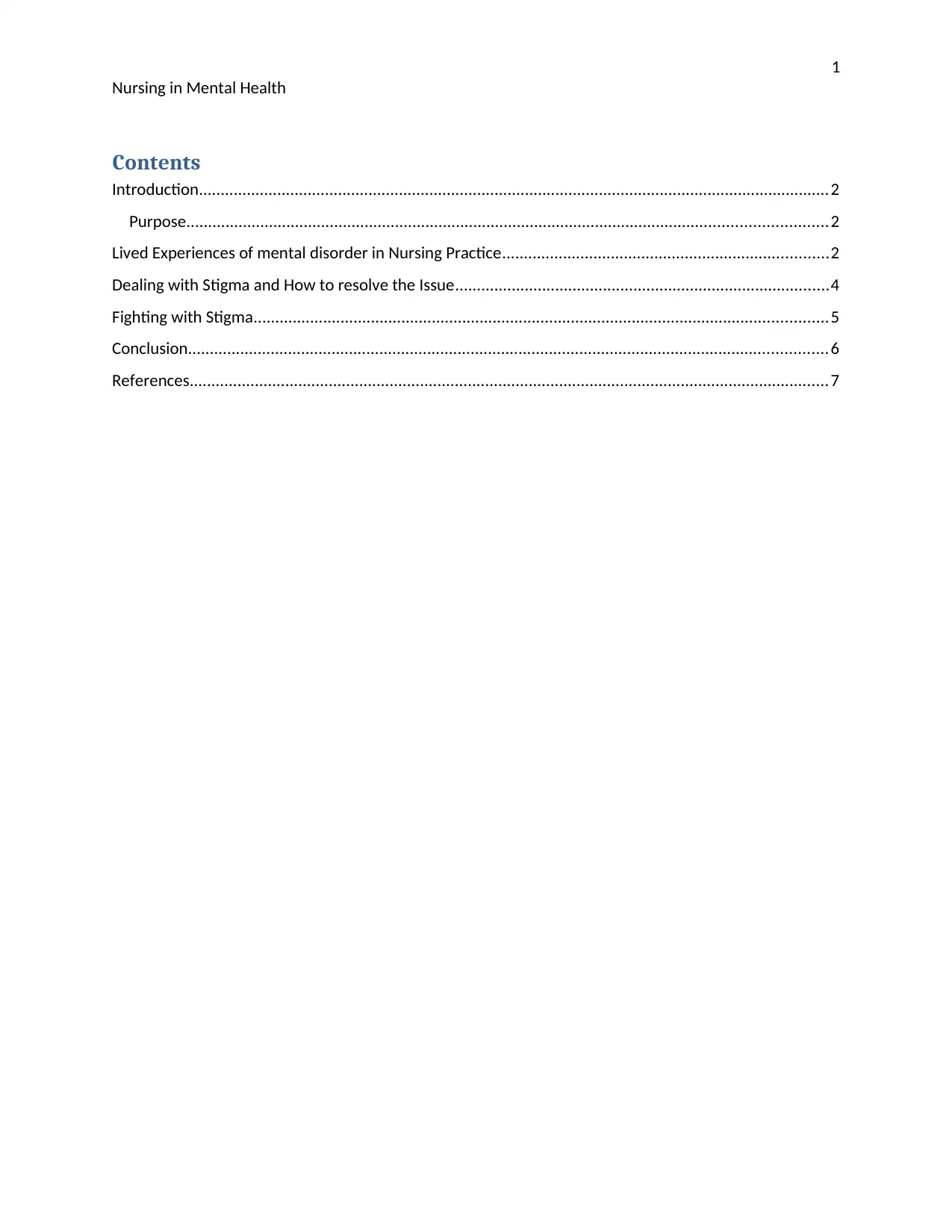
1
Nursing in Mental Health
Contents
Introduction.................................................................................................................................................2
Purpose...................................................................................................................................................2
Lived Experiences of mental disorder in Nursing Practice...........................................................................2
Dealing with Stigma and How to resolve the Issue......................................................................................4
Fighting with Stigma....................................................................................................................................5
Conclusion...................................................................................................................................................6
References...................................................................................................................................................7
Nursing in Mental Health
Contents
Introduction.................................................................................................................................................2
Purpose...................................................................................................................................................2
Lived Experiences of mental disorder in Nursing Practice...........................................................................2
Dealing with Stigma and How to resolve the Issue......................................................................................4
Fighting with Stigma....................................................................................................................................5
Conclusion...................................................................................................................................................6
References...................................................................................................................................................7
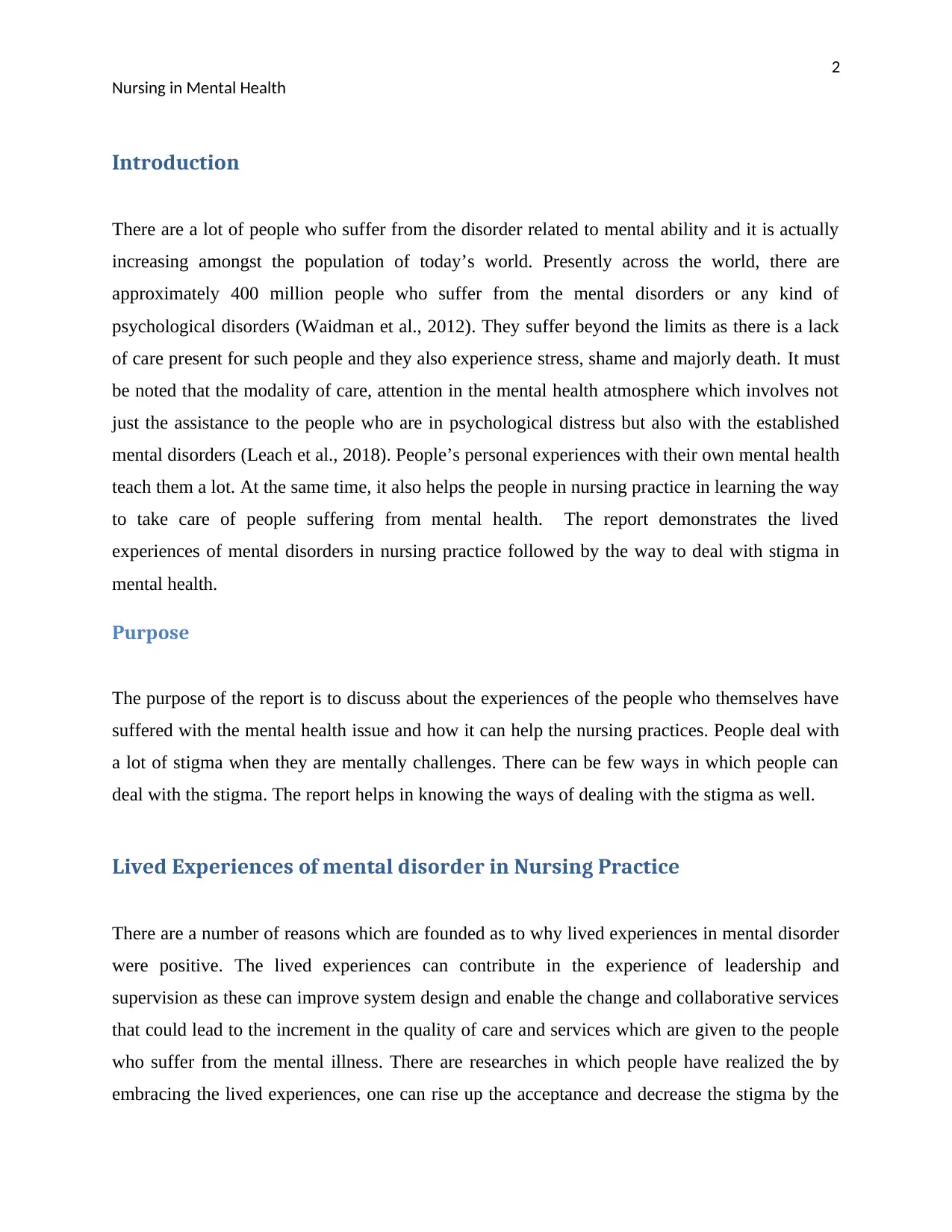
2
Nursing in Mental Health
Introduction
There are a lot of people who suffer from the disorder related to mental ability and it is actually
increasing amongst the population of today’s world. Presently across the world, there are
approximately 400 million people who suffer from the mental disorders or any kind of
psychological disorders (Waidman et al., 2012). They suffer beyond the limits as there is a lack
of care present for such people and they also experience stress, shame and majorly death. It must
be noted that the modality of care, attention in the mental health atmosphere which involves not
just the assistance to the people who are in psychological distress but also with the established
mental disorders (Leach et al., 2018). People’s personal experiences with their own mental health
teach them a lot. At the same time, it also helps the people in nursing practice in learning the way
to take care of people suffering from mental health. The report demonstrates the lived
experiences of mental disorders in nursing practice followed by the way to deal with stigma in
mental health.
Purpose
The purpose of the report is to discuss about the experiences of the people who themselves have
suffered with the mental health issue and how it can help the nursing practices. People deal with
a lot of stigma when they are mentally challenges. There can be few ways in which people can
deal with the stigma. The report helps in knowing the ways of dealing with the stigma as well.
Lived Experiences of mental disorder in Nursing Practice
There are a number of reasons which are founded as to why lived experiences in mental disorder
were positive. The lived experiences can contribute in the experience of leadership and
supervision as these can improve system design and enable the change and collaborative services
that could lead to the increment in the quality of care and services which are given to the people
who suffer from the mental illness. There are researches in which people have realized the by
embracing the lived experiences, one can rise up the acceptance and decrease the stigma by the
Nursing in Mental Health
Introduction
There are a lot of people who suffer from the disorder related to mental ability and it is actually
increasing amongst the population of today’s world. Presently across the world, there are
approximately 400 million people who suffer from the mental disorders or any kind of
psychological disorders (Waidman et al., 2012). They suffer beyond the limits as there is a lack
of care present for such people and they also experience stress, shame and majorly death. It must
be noted that the modality of care, attention in the mental health atmosphere which involves not
just the assistance to the people who are in psychological distress but also with the established
mental disorders (Leach et al., 2018). People’s personal experiences with their own mental health
teach them a lot. At the same time, it also helps the people in nursing practice in learning the way
to take care of people suffering from mental health. The report demonstrates the lived
experiences of mental disorders in nursing practice followed by the way to deal with stigma in
mental health.
Purpose
The purpose of the report is to discuss about the experiences of the people who themselves have
suffered with the mental health issue and how it can help the nursing practices. People deal with
a lot of stigma when they are mentally challenges. There can be few ways in which people can
deal with the stigma. The report helps in knowing the ways of dealing with the stigma as well.
Lived Experiences of mental disorder in Nursing Practice
There are a number of reasons which are founded as to why lived experiences in mental disorder
were positive. The lived experiences can contribute in the experience of leadership and
supervision as these can improve system design and enable the change and collaborative services
that could lead to the increment in the quality of care and services which are given to the people
who suffer from the mental illness. There are researches in which people have realized the by
embracing the lived experiences, one can rise up the acceptance and decrease the stigma by the
⊘ This is a preview!⊘
Do you want full access?
Subscribe today to unlock all pages.

Trusted by 1+ million students worldwide
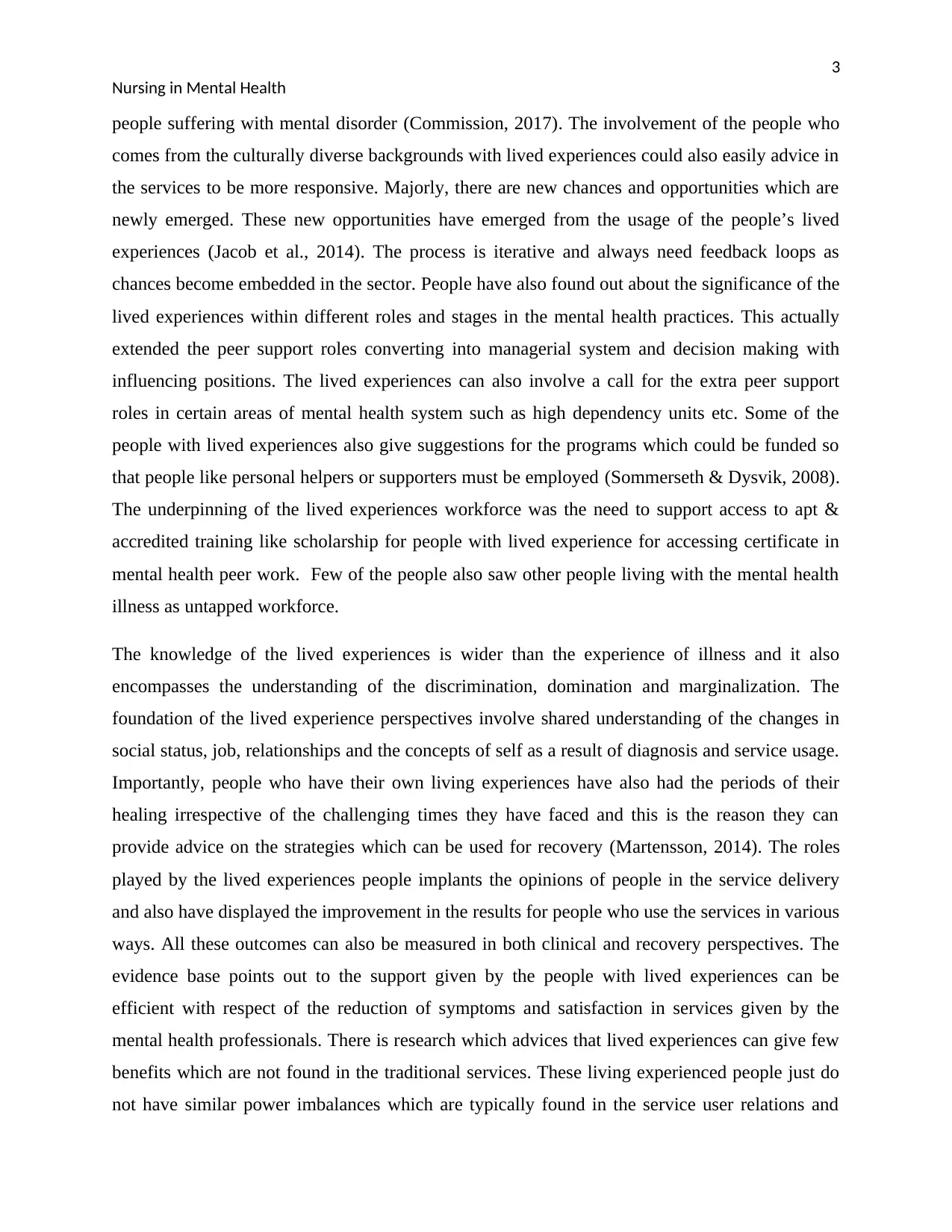
3
Nursing in Mental Health
people suffering with mental disorder (Commission, 2017). The involvement of the people who
comes from the culturally diverse backgrounds with lived experiences could also easily advice in
the services to be more responsive. Majorly, there are new chances and opportunities which are
newly emerged. These new opportunities have emerged from the usage of the people’s lived
experiences (Jacob et al., 2014). The process is iterative and always need feedback loops as
chances become embedded in the sector. People have also found out about the significance of the
lived experiences within different roles and stages in the mental health practices. This actually
extended the peer support roles converting into managerial system and decision making with
influencing positions. The lived experiences can also involve a call for the extra peer support
roles in certain areas of mental health system such as high dependency units etc. Some of the
people with lived experiences also give suggestions for the programs which could be funded so
that people like personal helpers or supporters must be employed (Sommerseth & Dysvik, 2008).
The underpinning of the lived experiences workforce was the need to support access to apt &
accredited training like scholarship for people with lived experience for accessing certificate in
mental health peer work. Few of the people also saw other people living with the mental health
illness as untapped workforce.
The knowledge of the lived experiences is wider than the experience of illness and it also
encompasses the understanding of the discrimination, domination and marginalization. The
foundation of the lived experience perspectives involve shared understanding of the changes in
social status, job, relationships and the concepts of self as a result of diagnosis and service usage.
Importantly, people who have their own living experiences have also had the periods of their
healing irrespective of the challenging times they have faced and this is the reason they can
provide advice on the strategies which can be used for recovery (Martensson, 2014). The roles
played by the lived experiences people implants the opinions of people in the service delivery
and also have displayed the improvement in the results for people who use the services in various
ways. All these outcomes can also be measured in both clinical and recovery perspectives. The
evidence base points out to the support given by the people with lived experiences can be
efficient with respect of the reduction of symptoms and satisfaction in services given by the
mental health professionals. There is research which advices that lived experiences can give few
benefits which are not found in the traditional services. These living experienced people just do
not have similar power imbalances which are typically found in the service user relations and
Nursing in Mental Health
people suffering with mental disorder (Commission, 2017). The involvement of the people who
comes from the culturally diverse backgrounds with lived experiences could also easily advice in
the services to be more responsive. Majorly, there are new chances and opportunities which are
newly emerged. These new opportunities have emerged from the usage of the people’s lived
experiences (Jacob et al., 2014). The process is iterative and always need feedback loops as
chances become embedded in the sector. People have also found out about the significance of the
lived experiences within different roles and stages in the mental health practices. This actually
extended the peer support roles converting into managerial system and decision making with
influencing positions. The lived experiences can also involve a call for the extra peer support
roles in certain areas of mental health system such as high dependency units etc. Some of the
people with lived experiences also give suggestions for the programs which could be funded so
that people like personal helpers or supporters must be employed (Sommerseth & Dysvik, 2008).
The underpinning of the lived experiences workforce was the need to support access to apt &
accredited training like scholarship for people with lived experience for accessing certificate in
mental health peer work. Few of the people also saw other people living with the mental health
illness as untapped workforce.
The knowledge of the lived experiences is wider than the experience of illness and it also
encompasses the understanding of the discrimination, domination and marginalization. The
foundation of the lived experience perspectives involve shared understanding of the changes in
social status, job, relationships and the concepts of self as a result of diagnosis and service usage.
Importantly, people who have their own living experiences have also had the periods of their
healing irrespective of the challenging times they have faced and this is the reason they can
provide advice on the strategies which can be used for recovery (Martensson, 2014). The roles
played by the lived experiences people implants the opinions of people in the service delivery
and also have displayed the improvement in the results for people who use the services in various
ways. All these outcomes can also be measured in both clinical and recovery perspectives. The
evidence base points out to the support given by the people with lived experiences can be
efficient with respect of the reduction of symptoms and satisfaction in services given by the
mental health professionals. There is research which advices that lived experiences can give few
benefits which are not found in the traditional services. These living experienced people just do
not have similar power imbalances which are typically found in the service user relations and
Paraphrase This Document
Need a fresh take? Get an instant paraphrase of this document with our AI Paraphraser
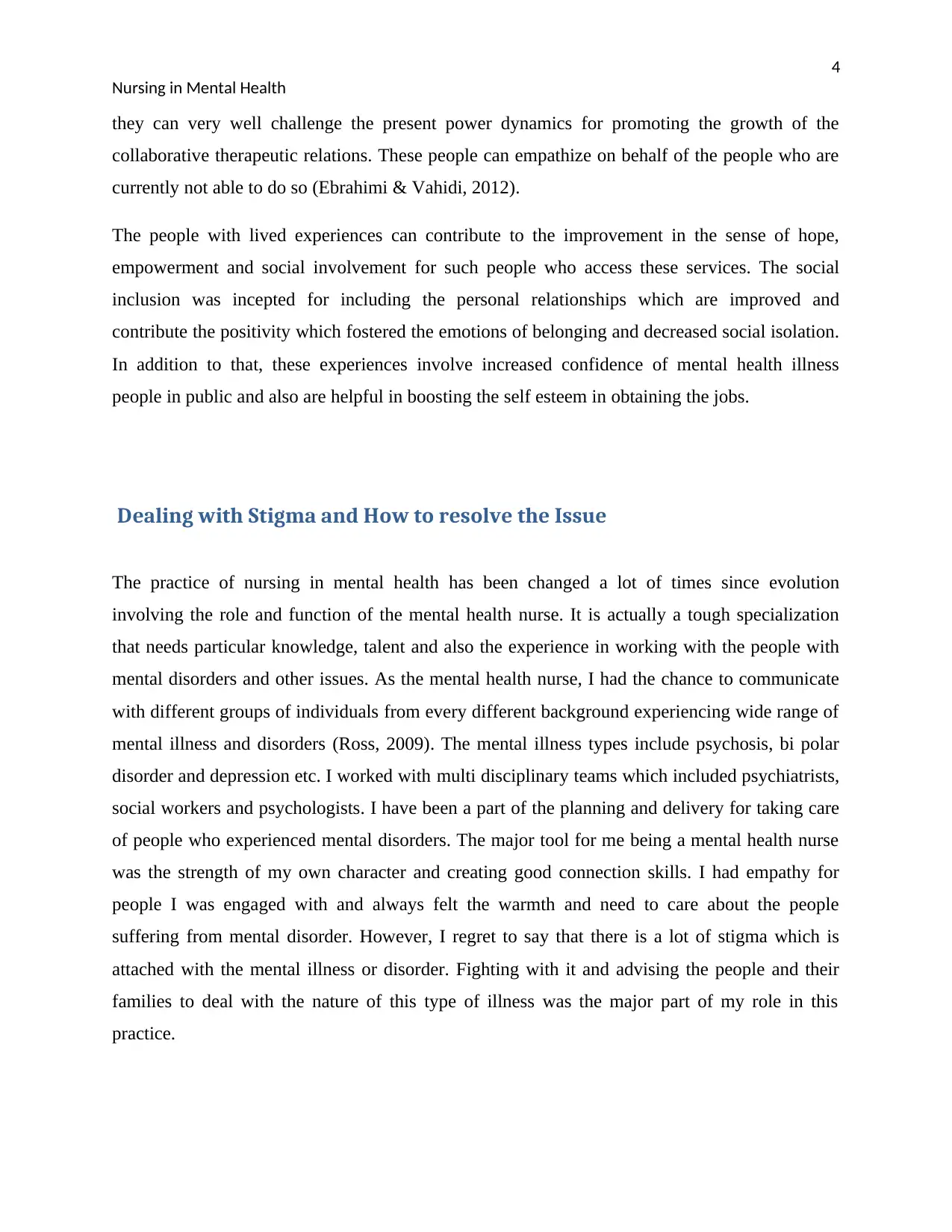
4
Nursing in Mental Health
they can very well challenge the present power dynamics for promoting the growth of the
collaborative therapeutic relations. These people can empathize on behalf of the people who are
currently not able to do so (Ebrahimi & Vahidi, 2012).
The people with lived experiences can contribute to the improvement in the sense of hope,
empowerment and social involvement for such people who access these services. The social
inclusion was incepted for including the personal relationships which are improved and
contribute the positivity which fostered the emotions of belonging and decreased social isolation.
In addition to that, these experiences involve increased confidence of mental health illness
people in public and also are helpful in boosting the self esteem in obtaining the jobs.
Dealing with Stigma and How to resolve the Issue
The practice of nursing in mental health has been changed a lot of times since evolution
involving the role and function of the mental health nurse. It is actually a tough specialization
that needs particular knowledge, talent and also the experience in working with the people with
mental disorders and other issues. As the mental health nurse, I had the chance to communicate
with different groups of individuals from every different background experiencing wide range of
mental illness and disorders (Ross, 2009). The mental illness types include psychosis, bi polar
disorder and depression etc. I worked with multi disciplinary teams which included psychiatrists,
social workers and psychologists. I have been a part of the planning and delivery for taking care
of people who experienced mental disorders. The major tool for me being a mental health nurse
was the strength of my own character and creating good connection skills. I had empathy for
people I was engaged with and always felt the warmth and need to care about the people
suffering from mental disorder. However, I regret to say that there is a lot of stigma which is
attached with the mental illness or disorder. Fighting with it and advising the people and their
families to deal with the nature of this type of illness was the major part of my role in this
practice.
Nursing in Mental Health
they can very well challenge the present power dynamics for promoting the growth of the
collaborative therapeutic relations. These people can empathize on behalf of the people who are
currently not able to do so (Ebrahimi & Vahidi, 2012).
The people with lived experiences can contribute to the improvement in the sense of hope,
empowerment and social involvement for such people who access these services. The social
inclusion was incepted for including the personal relationships which are improved and
contribute the positivity which fostered the emotions of belonging and decreased social isolation.
In addition to that, these experiences involve increased confidence of mental health illness
people in public and also are helpful in boosting the self esteem in obtaining the jobs.
Dealing with Stigma and How to resolve the Issue
The practice of nursing in mental health has been changed a lot of times since evolution
involving the role and function of the mental health nurse. It is actually a tough specialization
that needs particular knowledge, talent and also the experience in working with the people with
mental disorders and other issues. As the mental health nurse, I had the chance to communicate
with different groups of individuals from every different background experiencing wide range of
mental illness and disorders (Ross, 2009). The mental illness types include psychosis, bi polar
disorder and depression etc. I worked with multi disciplinary teams which included psychiatrists,
social workers and psychologists. I have been a part of the planning and delivery for taking care
of people who experienced mental disorders. The major tool for me being a mental health nurse
was the strength of my own character and creating good connection skills. I had empathy for
people I was engaged with and always felt the warmth and need to care about the people
suffering from mental disorder. However, I regret to say that there is a lot of stigma which is
attached with the mental illness or disorder. Fighting with it and advising the people and their
families to deal with the nature of this type of illness was the major part of my role in this
practice.
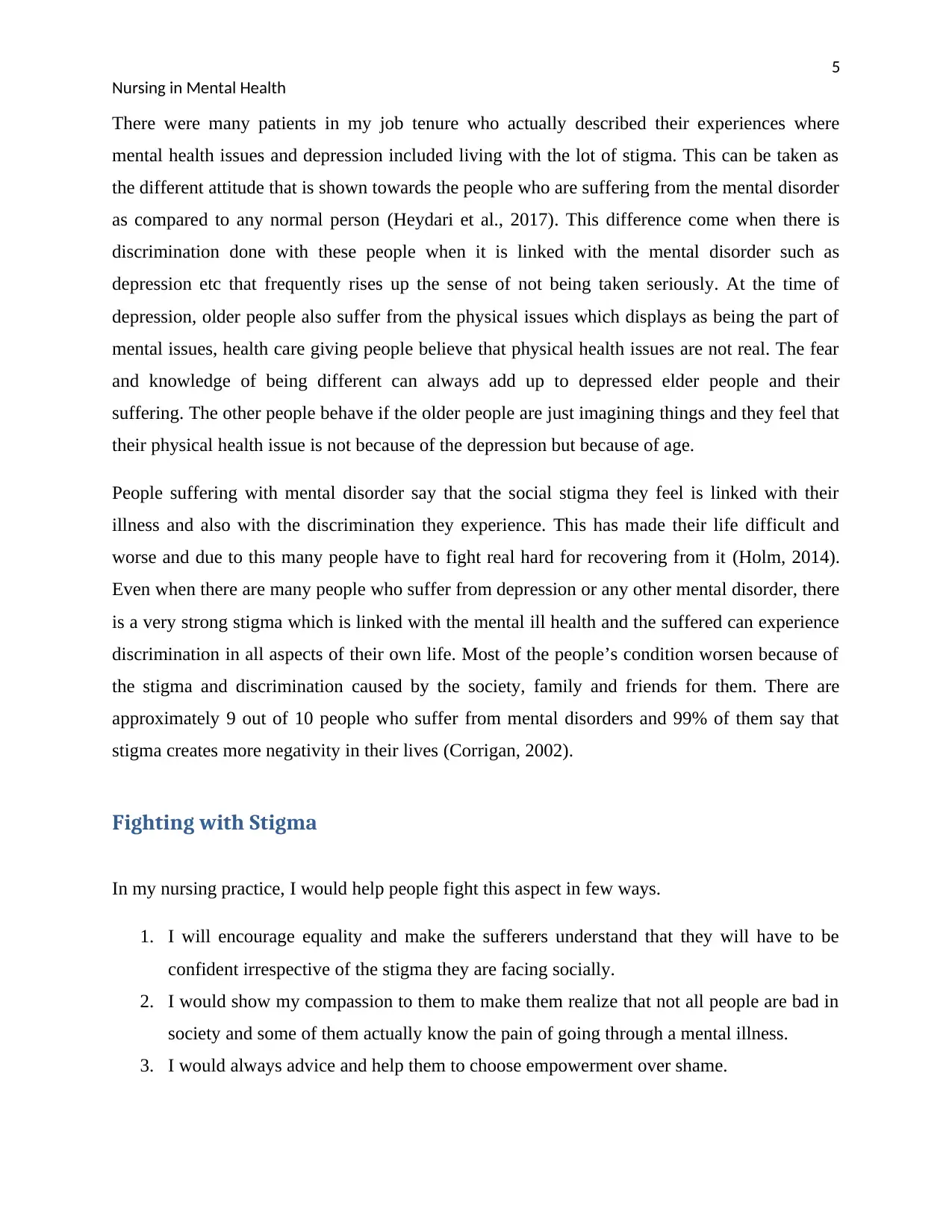
5
Nursing in Mental Health
There were many patients in my job tenure who actually described their experiences where
mental health issues and depression included living with the lot of stigma. This can be taken as
the different attitude that is shown towards the people who are suffering from the mental disorder
as compared to any normal person (Heydari et al., 2017). This difference come when there is
discrimination done with these people when it is linked with the mental disorder such as
depression etc that frequently rises up the sense of not being taken seriously. At the time of
depression, older people also suffer from the physical issues which displays as being the part of
mental issues, health care giving people believe that physical health issues are not real. The fear
and knowledge of being different can always add up to depressed elder people and their
suffering. The other people behave if the older people are just imagining things and they feel that
their physical health issue is not because of the depression but because of age.
People suffering with mental disorder say that the social stigma they feel is linked with their
illness and also with the discrimination they experience. This has made their life difficult and
worse and due to this many people have to fight real hard for recovering from it (Holm, 2014).
Even when there are many people who suffer from depression or any other mental disorder, there
is a very strong stigma which is linked with the mental ill health and the suffered can experience
discrimination in all aspects of their own life. Most of the people’s condition worsen because of
the stigma and discrimination caused by the society, family and friends for them. There are
approximately 9 out of 10 people who suffer from mental disorders and 99% of them say that
stigma creates more negativity in their lives (Corrigan, 2002).
Fighting with Stigma
In my nursing practice, I would help people fight this aspect in few ways.
1. I will encourage equality and make the sufferers understand that they will have to be
confident irrespective of the stigma they are facing socially.
2. I would show my compassion to them to make them realize that not all people are bad in
society and some of them actually know the pain of going through a mental illness.
3. I would always advice and help them to choose empowerment over shame.
Nursing in Mental Health
There were many patients in my job tenure who actually described their experiences where
mental health issues and depression included living with the lot of stigma. This can be taken as
the different attitude that is shown towards the people who are suffering from the mental disorder
as compared to any normal person (Heydari et al., 2017). This difference come when there is
discrimination done with these people when it is linked with the mental disorder such as
depression etc that frequently rises up the sense of not being taken seriously. At the time of
depression, older people also suffer from the physical issues which displays as being the part of
mental issues, health care giving people believe that physical health issues are not real. The fear
and knowledge of being different can always add up to depressed elder people and their
suffering. The other people behave if the older people are just imagining things and they feel that
their physical health issue is not because of the depression but because of age.
People suffering with mental disorder say that the social stigma they feel is linked with their
illness and also with the discrimination they experience. This has made their life difficult and
worse and due to this many people have to fight real hard for recovering from it (Holm, 2014).
Even when there are many people who suffer from depression or any other mental disorder, there
is a very strong stigma which is linked with the mental ill health and the suffered can experience
discrimination in all aspects of their own life. Most of the people’s condition worsen because of
the stigma and discrimination caused by the society, family and friends for them. There are
approximately 9 out of 10 people who suffer from mental disorders and 99% of them say that
stigma creates more negativity in their lives (Corrigan, 2002).
Fighting with Stigma
In my nursing practice, I would help people fight this aspect in few ways.
1. I will encourage equality and make the sufferers understand that they will have to be
confident irrespective of the stigma they are facing socially.
2. I would show my compassion to them to make them realize that not all people are bad in
society and some of them actually know the pain of going through a mental illness.
3. I would always advice and help them to choose empowerment over shame.
⊘ This is a preview!⊘
Do you want full access?
Subscribe today to unlock all pages.

Trusted by 1+ million students worldwide
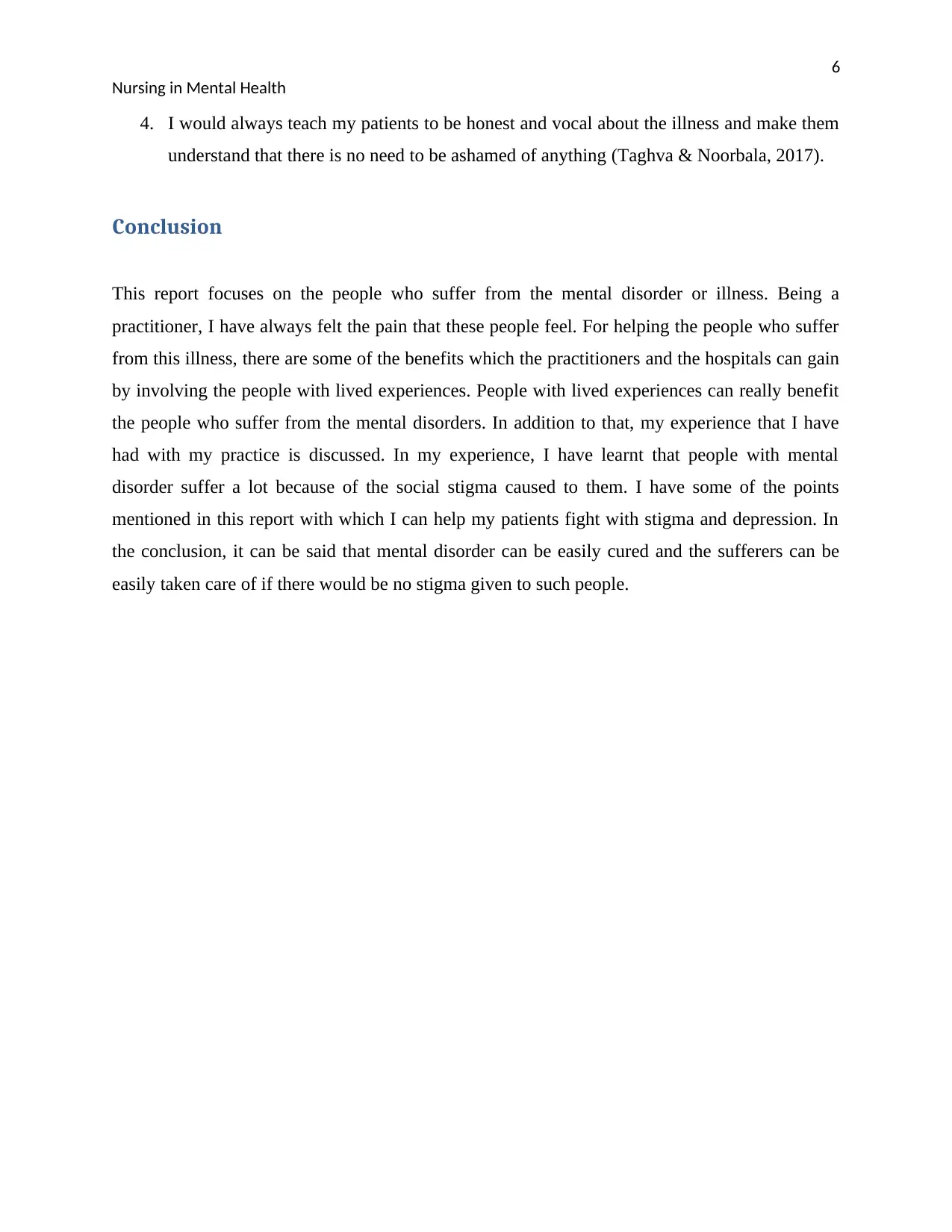
6
Nursing in Mental Health
4. I would always teach my patients to be honest and vocal about the illness and make them
understand that there is no need to be ashamed of anything (Taghva & Noorbala, 2017).
Conclusion
This report focuses on the people who suffer from the mental disorder or illness. Being a
practitioner, I have always felt the pain that these people feel. For helping the people who suffer
from this illness, there are some of the benefits which the practitioners and the hospitals can gain
by involving the people with lived experiences. People with lived experiences can really benefit
the people who suffer from the mental disorders. In addition to that, my experience that I have
had with my practice is discussed. In my experience, I have learnt that people with mental
disorder suffer a lot because of the social stigma caused to them. I have some of the points
mentioned in this report with which I can help my patients fight with stigma and depression. In
the conclusion, it can be said that mental disorder can be easily cured and the sufferers can be
easily taken care of if there would be no stigma given to such people.
Nursing in Mental Health
4. I would always teach my patients to be honest and vocal about the illness and make them
understand that there is no need to be ashamed of anything (Taghva & Noorbala, 2017).
Conclusion
This report focuses on the people who suffer from the mental disorder or illness. Being a
practitioner, I have always felt the pain that these people feel. For helping the people who suffer
from this illness, there are some of the benefits which the practitioners and the hospitals can gain
by involving the people with lived experiences. People with lived experiences can really benefit
the people who suffer from the mental disorders. In addition to that, my experience that I have
had with my practice is discussed. In my experience, I have learnt that people with mental
disorder suffer a lot because of the social stigma caused to them. I have some of the points
mentioned in this report with which I can help my patients fight with stigma and depression. In
the conclusion, it can be said that mental disorder can be easily cured and the sufferers can be
easily taken care of if there would be no stigma given to such people.
Paraphrase This Document
Need a fresh take? Get an instant paraphrase of this document with our AI Paraphraser
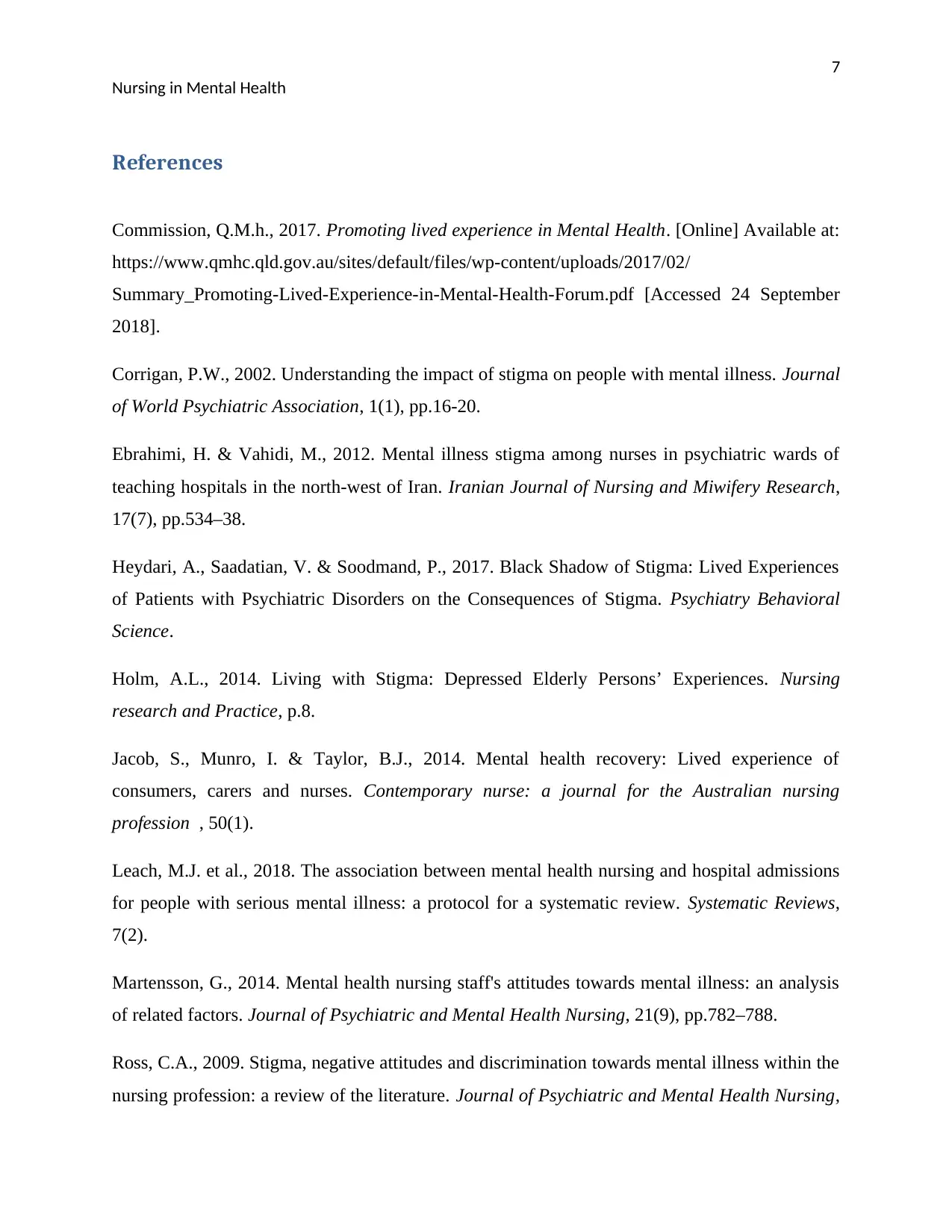
7
Nursing in Mental Health
References
Commission, Q.M.h., 2017. Promoting lived experience in Mental Health. [Online] Available at:
https://www.qmhc.qld.gov.au/sites/default/files/wp-content/uploads/2017/02/
Summary_Promoting-Lived-Experience-in-Mental-Health-Forum.pdf [Accessed 24 September
2018].
Corrigan, P.W., 2002. Understanding the impact of stigma on people with mental illness. Journal
of World Psychiatric Association, 1(1), pp.16-20.
Ebrahimi, H. & Vahidi, M., 2012. Mental illness stigma among nurses in psychiatric wards of
teaching hospitals in the north-west of Iran. Iranian Journal of Nursing and Miwifery Research,
17(7), pp.534–38.
Heydari, A., Saadatian, V. & Soodmand, P., 2017. Black Shadow of Stigma: Lived Experiences
of Patients with Psychiatric Disorders on the Consequences of Stigma. Psychiatry Behavioral
Science.
Holm, A.L., 2014. Living with Stigma: Depressed Elderly Persons’ Experiences. Nursing
research and Practice, p.8.
Jacob, S., Munro, I. & Taylor, B.J., 2014. Mental health recovery: Lived experience of
consumers, carers and nurses. Contemporary nurse: a journal for the Australian nursing
profession , 50(1).
Leach, M.J. et al., 2018. The association between mental health nursing and hospital admissions
for people with serious mental illness: a protocol for a systematic review. Systematic Reviews,
7(2).
Martensson, G., 2014. Mental health nursing staff's attitudes towards mental illness: an analysis
of related factors. Journal of Psychiatric and Mental Health Nursing, 21(9), pp.782–788.
Ross, C.A., 2009. Stigma, negative attitudes and discrimination towards mental illness within the
nursing profession: a review of the literature. Journal of Psychiatric and Mental Health Nursing,
Nursing in Mental Health
References
Commission, Q.M.h., 2017. Promoting lived experience in Mental Health. [Online] Available at:
https://www.qmhc.qld.gov.au/sites/default/files/wp-content/uploads/2017/02/
Summary_Promoting-Lived-Experience-in-Mental-Health-Forum.pdf [Accessed 24 September
2018].
Corrigan, P.W., 2002. Understanding the impact of stigma on people with mental illness. Journal
of World Psychiatric Association, 1(1), pp.16-20.
Ebrahimi, H. & Vahidi, M., 2012. Mental illness stigma among nurses in psychiatric wards of
teaching hospitals in the north-west of Iran. Iranian Journal of Nursing and Miwifery Research,
17(7), pp.534–38.
Heydari, A., Saadatian, V. & Soodmand, P., 2017. Black Shadow of Stigma: Lived Experiences
of Patients with Psychiatric Disorders on the Consequences of Stigma. Psychiatry Behavioral
Science.
Holm, A.L., 2014. Living with Stigma: Depressed Elderly Persons’ Experiences. Nursing
research and Practice, p.8.
Jacob, S., Munro, I. & Taylor, B.J., 2014. Mental health recovery: Lived experience of
consumers, carers and nurses. Contemporary nurse: a journal for the Australian nursing
profession , 50(1).
Leach, M.J. et al., 2018. The association between mental health nursing and hospital admissions
for people with serious mental illness: a protocol for a systematic review. Systematic Reviews,
7(2).
Martensson, G., 2014. Mental health nursing staff's attitudes towards mental illness: an analysis
of related factors. Journal of Psychiatric and Mental Health Nursing, 21(9), pp.782–788.
Ross, C.A., 2009. Stigma, negative attitudes and discrimination towards mental illness within the
nursing profession: a review of the literature. Journal of Psychiatric and Mental Health Nursing,
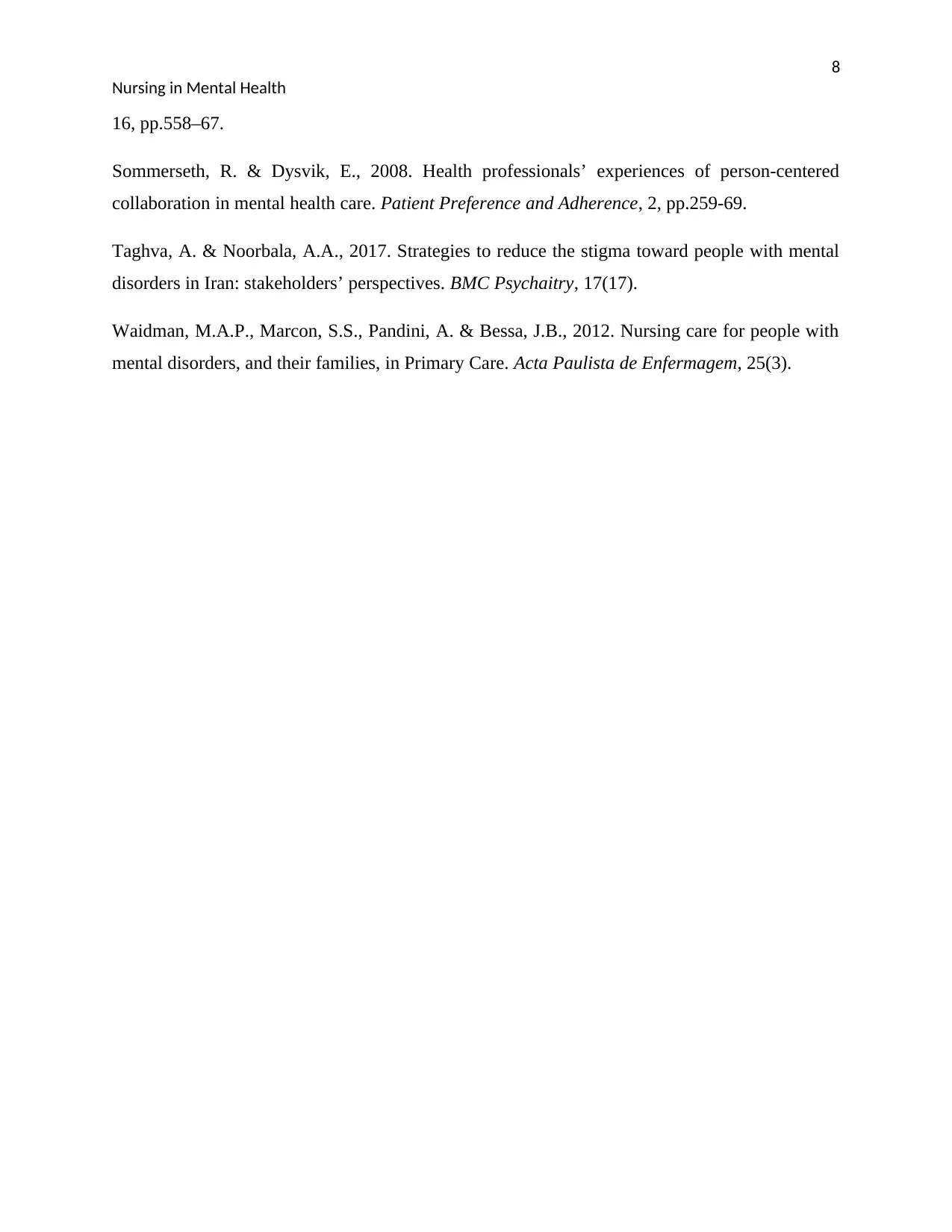
8
Nursing in Mental Health
16, pp.558–67.
Sommerseth, R. & Dysvik, E., 2008. Health professionals’ experiences of person-centered
collaboration in mental health care. Patient Preference and Adherence, 2, pp.259-69.
Taghva, A. & Noorbala, A.A., 2017. Strategies to reduce the stigma toward people with mental
disorders in Iran: stakeholders’ perspectives. BMC Psychaitry, 17(17).
Waidman, M.A.P., Marcon, S.S., Pandini, A. & Bessa, J.B., 2012. Nursing care for people with
mental disorders, and their families, in Primary Care. Acta Paulista de Enfermagem, 25(3).
Nursing in Mental Health
16, pp.558–67.
Sommerseth, R. & Dysvik, E., 2008. Health professionals’ experiences of person-centered
collaboration in mental health care. Patient Preference and Adherence, 2, pp.259-69.
Taghva, A. & Noorbala, A.A., 2017. Strategies to reduce the stigma toward people with mental
disorders in Iran: stakeholders’ perspectives. BMC Psychaitry, 17(17).
Waidman, M.A.P., Marcon, S.S., Pandini, A. & Bessa, J.B., 2012. Nursing care for people with
mental disorders, and their families, in Primary Care. Acta Paulista de Enfermagem, 25(3).
⊘ This is a preview!⊘
Do you want full access?
Subscribe today to unlock all pages.

Trusted by 1+ million students worldwide
1 out of 9
Related Documents
Your All-in-One AI-Powered Toolkit for Academic Success.
+13062052269
info@desklib.com
Available 24*7 on WhatsApp / Email
![[object Object]](/_next/static/media/star-bottom.7253800d.svg)
Unlock your academic potential
Copyright © 2020–2025 A2Z Services. All Rights Reserved. Developed and managed by ZUCOL.





